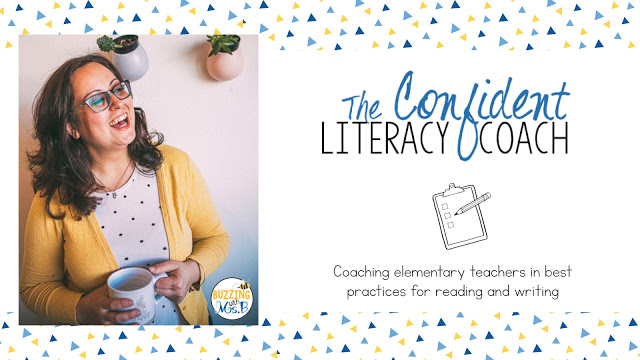10 Roles Coaches Serve...and What They Looked Like in My Coaching, Ep. 73 Buzzing with Ms. B: The Coaching Podcast
Instructional coaches serve the needs of students, teachers, and other school staff in different ways.
At one school, they may be responsible for helping to design curriculum to teach English learners in kindergarten while at another their role might entail teaching teachers how to better support students with disabilities.
Many times, the responsibilities of instructional coaches are misunderstood by teachers. I’ve found that when teachers don't understand the role of an instructional coach, they make it up.
Joellen Killion was my guest on Episode 50 of the Coaching Podcast. On this episode, I share my reflections on her article The 10 Roles of Coaches.
I explain what these roles look like in the classroom and my coaching practice.
The 10 Roles of Coaches
1. Resource Provider
In Episode 68, I discussed using different levels of support to create access points for all teachers. Providing resources is a level one or low-level support. It’s one of the least scary things a teacher can ask for from a coach, but it has big rewards.
As a coach, I would compile resources based on gaps in practice and the needs I noticed while co-planning with teachers. When you share materials with teachers, it helps build the relationship and shows that you think about them.
2. Data Coach
Coaches, teachers, and principals look at tons of data. This season during a coaching call episode with Christy al-Jerby, we talked about systems that can be helpful for reviewing assessment and data.
I suggested she have a standing meeting with teachers on the calendar to review data and plan for next steps. As a coach, I scheduled weekly data meetings in advance, often at the beginning of the year.
3. Curriculum Specialist
Coaches need to know a lot of stuff. Especially if they specialize in a content area like literacy or math.
They need to understand the national and state standards as well as local initiatives. Instructional coaches also need to know best practices and have access to resources.
In this role, I met with three grade levels every week for 90 minutes. I would walk them through the planning process. Teachers would share ideas and collaborate. Then we would structure this information so that teachers had lessons to try out in their classroom.
4. Instructional Specialist
Being an instructional specialist is not just about what is taught but about how you teach. This type of work often happened during PLCs.
During professional learning, we created lesson plans and talked about the strategies we could use to approach the activities. I kept a bank of high-impact strategies for each content area as well.
I share all about this planning process in The Confident Literacy Coach Course. I explains how to plan with teachers and build high-impact strategies that can be used throughout the year.
5. Mentor
Mentors are often thought of as something for new staff. But all teachers and coaches need a mentor because they help us grow.
As a coach, I had mentors to learn from and ask questions. They also helped me become a better a coach and that allowed me to help more teachers.
This coaching role was one of the most enjoyable. Developing close relationships and getting to know teachers as people was fun and rewarding.
6. Classroom Supporter
The real magic of coaching happens whenever you’re in the classroom and doing the work. The coaching cycle is impactful because you are modeling, observing, providing feedback, and planning alongside the teacher.
It may seem like you are spending a lot of time with one teacher, but it’s worth it. It really changes practice in the classroom.
7. Learning Facilitator
This role looks different depending on your school and district. I did a lot of professional development for our teachers.
When I visited classrooms and planned with teachers, I noted what was holding us back from achieving big changes in our students. I would weave these topics into our professional learning.
As a learning facilitator, you can create opportunities for teachers to learn from each other. I encouraged teachers to visit other classrooms and had willing teachers model strategies. You want colleagues to learn from each other because everybody in the room has some knowledge to share.
8. School Leader
This is another role that looks different depending on your campus. I was part of the leadership team. This group had discussions and dialogues about the growth of the school.
We talked about what we saw happening overall. Based on that, we set goals and supported those goals over time through our work.
9. Catalyst for Change
Being a catalyst for change isn’t always easy. Whether we do it through questioning, creating opportunities to learn, or modeling a new strategy, we're always pushing the envelope a little bit.
We get people to move because catalysts make things happen. This can be a stressful position because not everyone likes being pushed or pulled. It can be difficult to inspire others to try something different.
In my experience, teachers were more likely to listen to ideas when we worked on things they were concerned about. They wanted solutions to their problems.
10. Learner
Coaches must continually learn and reflect. To support teachers, coaches need to know stuff.
Instructional coaches need to be lifelong learners. We have to grow and get better because that’s what we ask teachers to do.
Those are the 10 roles that coaches serve and what I did in those roles as an instructional coach. I hope that it gives you an idea of what each role can look like in a school building.
To get my top tips on how to succeed in the different coaching roles listen to the entire episode.
If you want to learn more about how I began as a coach, check out The Instructional Coaching eBook Start-Up Guide. I wrote it after a few years of coaching. It teaches you some of the things that I did and what I wish I had done.
If you are a new coach or have under three years of experience, there's a lot of information in the eBook that will help you establish yourself as a coach. It helps you figure out how to do all the stuff that coaches are required to do.
Ready to listen? You can listen below with the media player, or search for Buzzing with MS. B: The Coaching Podcast anywhere you listen to podcasts!
Check me out at buzzingwithmsb.com and on Instagram @buzzingwithmsb.
Podcast produced by Fernie Ceniceros of Crowd & Town Creative


